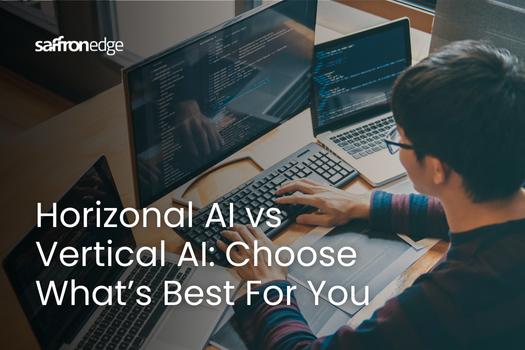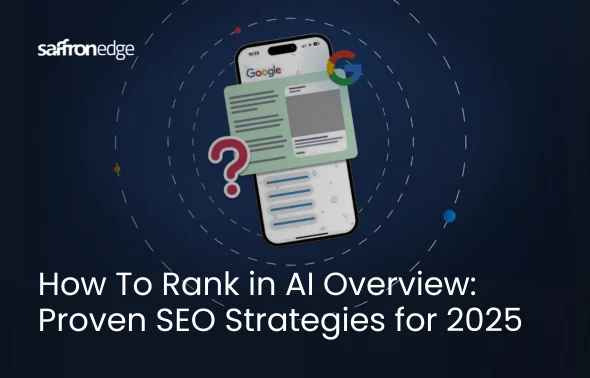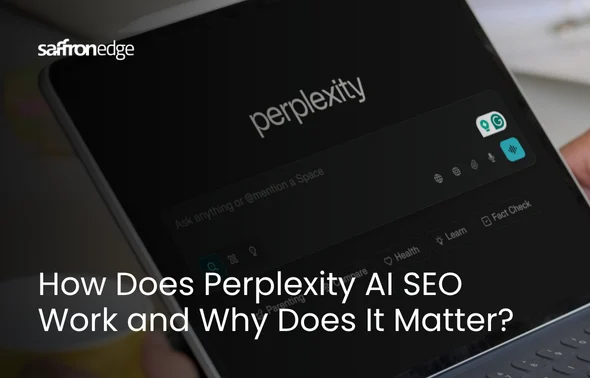Artificial Intelligence (AI) is transforming businesses, industries, and customer experiences, but not all AI systems are built similarly. The AI landscape can be divided into two major categories: Horizontal AI and Vertical AI.
Horizontal AI provides broad, general-purpose solutions that can be applied across multiple industries. Vertical AI is industry-specific, designed to solve problems and optimize workflows within a particular sector.
Understanding the differences between these two types of AI is crucial for businesses looking to implement AI for automation, decision-making, or efficiency improvements.
In this guide, we’ll explore Horizontal AI vs. Vertical AI, their advantages, use cases, challenges, and how to choose the right AI model for your business. Additionally, we’ll see what impact these have on B2B marketing and lead generation.
What is Horizontal AI?
Horizontal AI is an all-purpose AI system designed to work across various industries and applications. These solutions focus on broad automation and intelligence rather than being tailored to a single industry’s needs.
Characteristics of Horizontal AI
-
Industry-agnostic: This can be applied to different industries and sectors.
-
General-purpose Functionality: Performs common business tasks like automation, customer support, and analytics.
-
Scalable: Easily implemented across various businesses without major modifications.
-
Flexible & Adaptable: Can be customized with additional data but still works across industries.
Examples of Horizontal AI
-
Chatbots like ChatGPT & Google Bard: Used in customer service, content creation and automation.
-
Salesforce Einstein: AI-powered CRM for businesses in multiple industries.
-
AWS AI & Google Cloud AI: Cloud-based AI services companies use across sectors.
-
Grammarly: AI-powered writing assistant used in education, business, and marketing.
Benefits of Horizontal AI
-
Cost-Effective: Saves time and resources by providing a single AI solution for multiple industries.
-
Easy to Scale: Companies can implement it across departments without needing industry-specific customization.
-
Rapid Deployment: It requires less development time and effort than custom-built vertical AI solutions.
However, Horizontal AI lacks deep industry-specific expertise, making it less effective for businesses that require specialized AI solutions.
What is Vertical AI?
Vertical AI is built specifically for a single industry or niche market. It is designed to address specific challenges, workflows, and regulatory requirements within a particular sector.
Characteristics of Vertical AI
-
Industry-Specific: Designed with deep knowledge of a particular industry’s needs.
-
Custom-Tailored Solutions: Optimized for specific workflows, compliance requirements, and challenges.
-
Higher Accuracy: Delivers precise results due to its specialization.
-
Data-Driven Insights: Uses industry-specific datasets to improve decision-making.
Examples of Vertical AI
-
Zebra Medical Vision: AI-powered medical imaging for healthcare professionals.
-
KAI for Banking: AI chatbot tailored for financial institutions and customer support.
-
IBM Watson Health: AI designed specifically for medical diagnostics and patient care.
-
PathAI: AI-powered cancer diagnosis system used in pathology.
Benefits of Vertical AI
-
Higher Accuracy & Reliability: Designed specifically for an industry, ensuring better results than general AI.
-
Industry-Specific Compliance: Meets regulatory standards (e.g., HIPAA for healthcare, GDPR for finance).
-
Competitive Advantage: Businesses using Vertical AI gain specialized automation and decision-making capabilities.
While Vertical AI provides deeper expertise, it requires higher development costs and customization, making it less scalable than Horizontal AI.
Horizontal AI vs. Vertical AI: A Detailed Comparison
Before discussing these 2 concepts in depth, let’s take an overview of the key differences between Horizontal and Vertical AI.
| Feature | Horizontal AI | Vertical AI |
|---|---|---|
| Scope | Works across industries | Industry-specific |
| Customization | General-purpose | Highly specialized |
| Scalability | Easily scalable | Limited to one industry |
| Accuracy | Moderate | High (tailored for industry needs) |
| Cost | Lower development costs | Higher due to customization |
| Implementation Time | Faster deployment | Requires more time and industry data/td> |
| Examples | ChatGPT, Salesforce Einstein, Google AI | Zebra Medical, Watson Health, KAI Banking |
Real-World Applications of Horizontal and Vertical AI
Where is Horizontal AI Used?
-
Customer Service: AI chatbots handle FAQs, automate responses, and reduce human workload.
-
Marketing & Content Creation: AI-powered tools generate content, analyze campaigns, and optimize SEO strategies.
-
IT & Cybersecurity: AI detects threats, automates security protocols, and provides real-time risk assessments.
-
HR & Recruitment: AI helps with resume screening, interview scheduling, and candidate assessments.
Where is Vertical AI Used?
-
Healthcare: AI-powered diagnostics, medical imaging, and patient data analysis (e.g., PathAI, IBM Watson Health).
-
Finance: AI-driven fraud detection, risk assessment, and automated trading (e.g., KAI Banking, Zest AI).
-
Retail & E-Commerce: Personalized recommendations, AI-driven inventory management, and pricing optimization.
-
Manufacturing: AI-powered automation in production lines, predictive maintenance, and quality control.
Leveraging AI for B2B Lead Generation
How Horizontal AI Can Streamline Your Strategy?
In today’s fast-paced B2B marketing landscape, generating high-quality leads and nurturing them effectively is crucial for business growth. Horizontal AI tools are versatile and adaptable, providing broad applications across industries, which can help streamline lead generation efforts.
In this section, we’ll explore how Horizontal AI can elevate lead generation strategies in B2B marketing.
A. Improve Lead Qualification and Segmentation
-
Automated Lead Scoring: Horizontal AI tools, such as machine learning algorithms, can analyze vast amounts of data to evaluate the likelihood of a lead converting into a customer. These tools use factors like past behavior, engagement history, and demographic details to assign lead scores, helping marketers prioritize high-value prospects.
-
Predictive Analytics for Better Segmentation: By analyzing historical data and trends, Horizontal AI systems can predict customer behavior and segment leads based on specific characteristics, improving personalization in communication. This helps marketers target the right audience with tailored messages, increasing engagement and conversion rates.
-
Efficient Data Processing: Horizontal AI tools are designed to handle large amounts of unstructured data, such as social media interactions, website clicks, and email responses. This data processing enables faster and more accurate lead identification, ensuring that sales teams can focus their efforts on leads that are more likely to convert.
B. Automating Lead Nurturing and Engagement at Scale
-
AI Chatbots and Conversational Marketing: AI-driven chatbots can engage with prospects in real time, answer queries, qualify leads, and direct them to the appropriate resources. This enhances customer experience and keeps leads moving through the sales funnel, even during off-hours.
-
Email Automation and Personalization: Horizontal AI allows B2B marketers to create dynamic email marketing campaigns that adjust based on individual lead preferences, behaviors, and interactions. AI tools can trigger personalized emails that provide value at each stage of the buyer’s journey, boosting engagement and helping nurture leads more effectively.
-
Content Recommendations: Using Horizontal AI, marketers can provide tailored content to leads at scale. AI systems can analyze past interactions and preferences to recommend white papers, blog posts, webinars, or case studies that will be most relevant to each prospect, fostering trust and helping to nurture leads into paying customers.
Vertical AI for B2B Marketing and Industry-specific Solutions
While Horizontal AI offers broad solutions for lead generation across industries, Vertical AI takes a more specialized approach by focusing on the unique needs of individual sectors.
Vertical AI solutions are designed to understand and address the complexities of specific industries, making them an invaluable tool for businesses targeting niche markets.
A. Tailoring Systems Using Industry-Specific Data and Insights
-
Industry-Specific Lead Targeting: Vertical AI tools are built to understand the nuances and requirements of specific industries. For example, a Vertical AI system for the healthcare sector can process medical records, insurance claims, and compliance regulations to help marketers identify potential leads within that industry.
-
Predicting Industry Trends: Vertical AI can analyze large datasets within a specific sector, such as past purchase behaviors or seasonal trends. This predictive capability allows B2B marketers to understand market shifts, identify emerging leads, and create proactive marketing strategies.
-
Customizing Offers and Messaging: Vertical AI enables hyper-targeted messaging by understanding the pain points of specific industries. For example, in B2B SaaS marketing for financial services, AI can help marketers create content and offers that align with financial professionals' unique challenges, such as regulatory changes, compliance, or market volatility.
B. Enhancing Lead Generation with Industry-Specific AI Applications
-
Healthcare AI Solutions: AI tools in the healthcare sector can help marketers generate leads by segmenting them based on medical needs, patient demographics, and past interactions with healthcare services. For example, AI can help pharmaceutical companies generate leads from clinics that would benefit from a particular drug, targeting specific doctors, hospitals, or healthcare providers.
-
Manufacturing Industry AI Applications: AI tools can help industrial manufacturing businesses generate leads by analyzing production efficiency data and offering personalized marketing messages to businesses looking to optimize their operations.
-
Financial Services AI Tools: Vertical AI tools tailored for the financial services sector help marketers capture leads by focusing on financial data analysis, credit scores, and market predictions. They can automatically segment businesses based on their financial health and readiness to invest in new financial products or services.
Which AI Model is Right for Your Business?
Choosing between Horizontal AI and Vertical AI depends on your business goals, industry needs, and budget.
A. Use Horizontal AI if:
-
You need a scalable AI solution that works across multiple business functions.
-
You want a cost-effective way to automate customer service and content creation tasks.
-
Your business requires a general-purpose AI that doesn’t need deep industry knowledge.
B. Use Vertical AI if:
-
Your industry has unique challenges, regulations, or workflows that require a tailored solution.
-
You need highly accurate AI solutions designed for a specific market.
-
You want an AI system that integrates with industry-specific tools and databases.
Businesses often combine both approaches—using Horizontal AI for general tasks and Vertical AI for industry-specific processes.
Conclusion
Both Horizontal and Vertical AI have unique strengths and ideal applications. Horizontal AI is known for its scalability and cost-effectiveness, while Vertical AI delivers in-depth expertise and tailored solutions for specific industries.
To maximize efficiency, businesses should carefully assess their AI requirements and often adopt a hybrid approach.
If you want to integrate AI-powered automation into your business, Saffron Edge offers state-of-the-art AI solutions to meet your needs. Contact us today to discover how AI agents can optimize your operations and accelerate your business growth! 🚀
Rank in AI Overviews
Frequently Asked Questions
What is the biggest difference between Horizontal AI and Vertical AI?
Horizontal AI is a general-purpose AI that works across multiple industries, while Vertical AI is industry-specific and designed to solve specialized problems.
Can businesses use both Horizontal and Vertical AI?
Yes! Many companies use Horizontal AI for general automation and Vertical AI for specialized industry applications.
Is Vertical AI more expensive than Horizontal AI?
Vertical AI is more costly because it requires customization, industry-specific data, and regulatory compliance.
Which industries benefit most from Vertical AI?
Healthcare, finance, retail, and manufacturing benefit the most because they require highly specialized AI solutions.
Is ChatGPT an example of Horizontal AI?
ChatGPT is Horizontal AI because it can be used across multiple industries, including customer service, marketing, and content creation.
How do I decide which AI model to use?
Consider your business needs, scalability requirements, and industry challenges when deciding between Horizontal AI (for broad use) and Vertical AI (for specialized tasks).
Related Blogs
We explore and publish the latest & most underrated content before it becomes a trend.

Subscribe to Saffron Edge Newsletter!

Rank in AI Overviews








